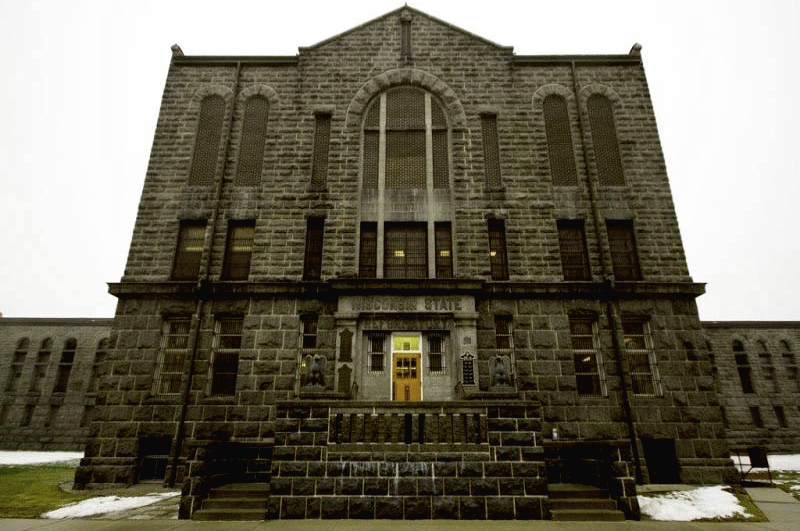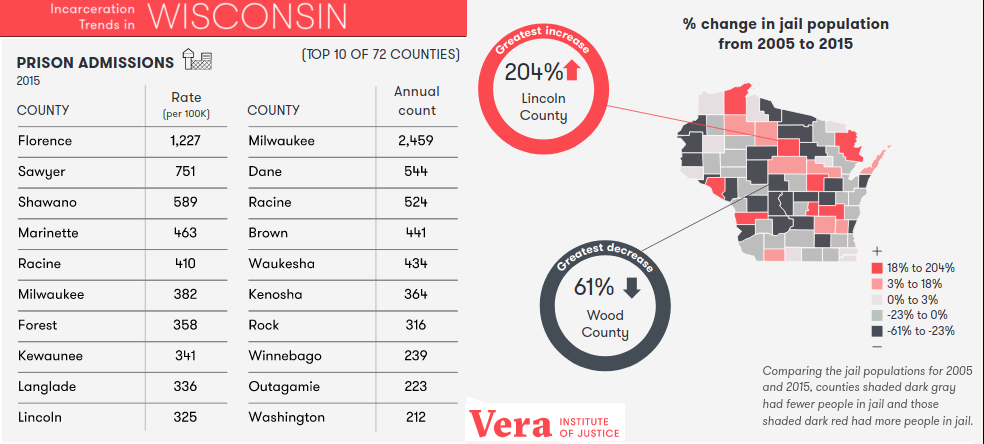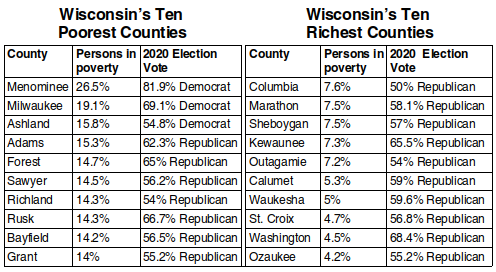Repost from ABOLISHmke
 Green Bay CI[/caption]
Green Bay CI[/caption]Despite many cultural differences, Wisconsin’s prison system has a similar negative impact on people in both under-resourced rural communities and Milwaukee’s northside. Those who have been cut out of the jobs economy, who’ve been marginalized and neglected by political elites, business owners, and corporations, are more likely to struggle with addiction, despair, and violence. We know what comes next – they end up going to prison.
In prison, negligence, abuse, and confinement cause great and lasting harm. People then return with that trauma to the same struggling communities they were taken from. The addedhe stigma of a criminal record further removes them from economic opportunities. They become more likely to resort to crimes of survival, or of addiction and emotional distress. In this way, prison drives up crime. It contributes to a cycle of harmful behavior, of people hurting their neighbors.
Whether you grew up on Milwaukee’s police-saturated northside or Wisconsin’s small towns devastated by the collapse of the farming economy and closure of mills and factories, the business owners and wealthy elites have set up very similar futures for many of us. Those who break down under economic stress go to prison for a few years, then return to a life of greater economic stress, more likely to break down again and hurt someone.
The vast majority of people living in Milwaukee recognize this harmful cycle. That’s why we consistently vote for politicians who want to reduce the prison system and fund alternatives to police. Unfortunately, politicians representing wealthy suburban elites have used gerrymandering and other dirty tricks to hijack the political process and obstruct these efforts. The gerrymandering of the legislature means votes by Milwaukeeans count for less than other Wisconsinites.
It’s easy to understand why the violence of policing and prison continues to happen to the neglected areas of Milwaukee: an unrepresentative and unresponsive political system has forced it upon us. What’s harder to understand is why working people in other economically neglected – but politically over-represented – areas accept these impositions of state control on their lives.
We all stand on the edge of the prison trap, just one mistake or hardship away from a life cycling between incarceration and poverty. This has little to do with justice or with ethical behavior. It is well known that people living in poverty are much more likely to go to prison than the rich, regardless of criminal activity. People in poverty are also much more likely to be harmed by crime. Cycling people from prison trauma through economic stress makes no sense from a public safety perspective, but it is the only approach that the politicians offer struggling communities on both sides of the urban/rural divide.
The difference is, unlike their urban counterparts, under-resourced rural communities often vote with the wealthy to further neglect social welfare and to expand prison.
Both incarceration and poverty are rising in rural areas. Nine out of ten of Wisconsin’s poorest counties are considered rural areas. Some of these counties have also seen the greatest increases in incarceration rates, while Milwaukee’s incarceration rate slowly declines.
 After years of pushing for prison reform on a state level and gaining nothing, people from Milwaukee have turned their attention to local politics instead. The African American Roundtable’s LiberateMKE campaign is defending the community by fighting to defund the police. Mass protests with radical demands kicked out Chief Morales and Chief Flynn before him. These protest movements also deter the district attorney, judges, and community supervision agents from incarcerating so many people. When state laws that were supposed to get Lincoln Hills and Copper Lake closed to protect our children from abuse failed, Youth Justice MKE and community organizers focused pressure on the DOC and Division of Youth and Family Services to release Milwaukee children and depopulate the facilities while they remained open.
After years of pushing for prison reform on a state level and gaining nothing, people from Milwaukee have turned their attention to local politics instead. The African American Roundtable’s LiberateMKE campaign is defending the community by fighting to defund the police. Mass protests with radical demands kicked out Chief Morales and Chief Flynn before him. These protest movements also deter the district attorney, judges, and community supervision agents from incarcerating so many people. When state laws that were supposed to get Lincoln Hills and Copper Lake closed to protect our children from abuse failed, Youth Justice MKE and community organizers focused pressure on the DOC and Division of Youth and Family Services to release Milwaukee children and depopulate the facilities while they remained open.
Meanwhile, many rural communities continue to support “tougher on crime” policies of the Republican Party, even as those policies cause more and more harm to rural Wisconsinites. Seven of Wisconsin’s ten poorest counties voted Republican in the last election, three of which by a more than 10% margin. Meanwhile, all ten of the richest counties, where the business owners and corporate elites live in luxury, elect Republicans.
The people of Rusk and Forest counties have been deprived of viable livelihoods by the same sorts of corporations, bankers, and business elites who ripped off the northside of Milwaukee. Why do we vote so differently? Rather than voting for support, protection, and relief, rural Wisconsinites vote with those elites for punishment.
 Historically, racial hatred and resentments are part of the problem. White people sometimes choose to deprive themselves of things, rather than sharing access with others. I grew up in Burlington, where the long-standing racism of the school board was recently exposed. I’ve seen huge confederate flags flying in Waupun and around the state. I also know that most rural Wisconsinites are decent, generous people who do not believe in that kind of overt racism. At the same time, no one can deny that it exists or is often tolerated and excused.
Historically, racial hatred and resentments are part of the problem. White people sometimes choose to deprive themselves of things, rather than sharing access with others. I grew up in Burlington, where the long-standing racism of the school board was recently exposed. I’ve seen huge confederate flags flying in Waupun and around the state. I also know that most rural Wisconsinites are decent, generous people who do not believe in that kind of overt racism. At the same time, no one can deny that it exists or is often tolerated and excused.
Both parties have been very good at playing cultural and racial differences against each other to keep working class people divided. Republican Party operatives vilify Black people and convince their voters to destroy social safety nets rather than extend them to include all people. Meanwhile, Democratic messaging focuses on stereotypes that rural whites are backward, uneducated, and hateful. As a result, we stay separate, voting for whichever party claims to represent us. The urban / rural divide deepens. Last summer’s protests began changing that; young people opposing racism across the state stood up and began finding each other.
Other than racism, the common explanation for pro-prison attitudes in rural areas is jobs. People are desperate for work, and the state most often offers prison jobs. This is disgusting, because these guard jobs are being offered by the same political elites who adopted pro-trade policies closing factories and mills, who helped to indebt family farms and then let banks and massive agribusiness conglomerates buy them out. After taking so much, so fundamentally changing the landscape of rural Wisconsin life, what do they push into that void? Prisons.
Prison jobs are bad jobs. Guards bring the trauma of holding others captive home. Elevated rates of suicide, substance abuse, domestic violence follow people who hold others captive. Many can see it happening and quit. A report based on open record requests by Forum for Understanding Prisons revealed that the alleged staffing crisis in the DOC was actually more of a turnover crisis. Many people quit shortly after starting jobs as guards.
Elites from both political parties keep trying to solve the problem by raising wages for prison guards. They hope that more money will lure people into these soul-crushing and trauma-inducing jobs. Instead, they could be reducing incarceration and returning real, fulfilling work to rural Wisconsinites. If the best politicians have to offer is throwing some of us in cages, and paying others of us to hold those cages shut, then it’s time to get better politicians.
We must not allow politicians who only represent and care about business owners in the rich suburbs to build more prisons. We must demand that they return honest work and soul-nourishing opportunities to all in Wisconsin. We must reach across the urban/ rural divide. To unite as workers and demand a fair chance at living as free people. We can toss these crooked, lying, money-seeking politicians out. The people of Milwaukee have had enough. We’re already organizing to defend ourselves against this kind of governmental imposition. If rural people do not join up, if they continue to support building prisons, they are going to find that those prisons end up filled by their friends and neighbors.
No comments:
Post a Comment